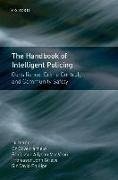Read more
Informationen zum Autor Professor John Grieve QPM is Professor Emeritus and Chair of the John Grieve Centre for Policing at London Metropolitan University, and a former Director of Intelligence for the Metropolitan Police. Professor Allyson McVean is Director and Founder of the John Grieve Centre for Policing and Community Safety, London Metropolitan University. She has extensive practical experience of working with police forces on issues of dangerous offender management and community impact assessments, and thus brings a third party perspective to the partnership use of intelligence. Dr Clive Harfield is Deputy Director of the John Grieve Centre for Policing and Community Safety and a police commander and national intelligence officer. Dr Harfield is co-author of two Blackstone's Practical Policing titles, Covert Investigation and Intelligence. Sir David Phillips is Director of the National Centre of Policing Excellence and former Chief Constable of Kent Police. He was knighted in 2000 for his services to policing and is an honorary fellow of Christ Church, University of Oxford. Sir David is best known for his development of 'intelligence led' policing, his contributions to criminal justice reform and his advocacy of professional skills in investigation. He was a member of the Criminal Justice Council by appointment of the Lord Chancellor. Klappentext In the last twenty-five years, there has been a growing awareness of the role of intelligence within law enforcement activity. This edited volume on intelligence is the first of its kind to draw together in one volume scholarly and practical perspectives on intelligence in policing. In a range of essays from leading experts and practitioners, this book sets out the main concepts and philosophies behind the practical framework for intelligence gathering and analysis in UK policing. The book's four Editors bring a wealth of experience and knowledge to bear upon the subject matter: Sir David Phillips and Professor John Grieve were instrumental in developing and defining the role of intelligence in English policing; Dr Clive Harfield has operational experience managing an intelligence unit and was a national intelligence officer; and Professor Allyson MacVean has practical experience working with the police on issues of dangerous offender management and community impact assessments. > Divided into four parts, each section of the book begins with a comprehensive overview of the topic written by the Editors. The Editors pose a series of questions which are explored further by expert contributors in a series of essays, each one an important contribution to the treatment of intelligence in policing today. Part One looks at the history and theory of intelligence in policing, reflecting on how the police service arrived at its current approaches to intelligence; Part Two deals with analysis, examining the police relationship with analysts and the various models of analysis; Part Three looks at partnership with other agencies (prisons/local authorities) and draws on case studies to explore how different frameworks can be structured; and Part Four looks to the future and asks whether intelligence-led policing is the answer. Contributors include R. Mark Evans, Director of Analytical Services for the Police Service of Northern Ireland and National Manager for Intelligence at >This thoughtful and pioneering volume is a timely addition to publications on policing, and will be of interest to police, the Security Services, and academics alike. ...

